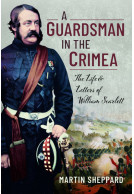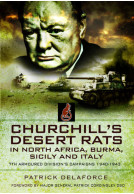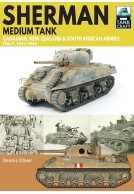General Sir James Scarlett (Hardback)
The Life and Letters of the Commander of the Heavy Brigade at Balaklava
Imprint: Pen & Sword Military
Pages: 320
ISBN: 9781399089982
Published: 27th January 2022
(click here for international delivery rates)
Order within the next 5 hours, 5 minutes to get your order processed the next working day!
Need a currency converter? Check XE.com for live rates
| Other formats available - Buy the Hardback and get the eBook for £1.99! | Price |
|---|---|
| General Sir James Scarlett eBook (39.6 MB) Add to Basket | £6.99 |
The morning of the Battle of Balaklava, on 25 October 1854, saw a desperate charge against a greatly superior Russian force. Epitomised by the reckless courage of the British cavalry in the face of heavy odds, the charge was a complete success, putting the Russians to flight. This charge was not that of the Light Brigade, which took place later the same day, but that of the Heavy Brigade, under the command of General James Scarlett. Caught by surprise, Scarlett dressed the three hundred men nearest to him, placed himself well ahead of them and charged uphill to an extraordinary and unlikely victory.
The Charge of the Heavy Brigade, a resounding success, has unjustly been overshadowed by the blunders that led to the heroic defeat of the Charge of the Light Brigade. James Scarlett himself has also been unfairly ignored due the focus on the enmity between the Earls of Cardigan and Lucan. The strategic significance of the Heavy Brigade’s victory, preventing the Russians capturing the key British base, the port of Balaklava, has been overlooked, as has General Scarlett’s decisive part in thwarting Russia’s best chance of winning the Crimean War.
Although his heroic leadership at Balaklava was undoubtedly the most important event in James Scarlett’s life, he had a long and distinguished military career before and after the Crimean War. Based on his own previously unpublished letters, including a long description of his day at Balaklava, General Sir James Scarlett is the first book focused on a remarkable soldier.
A two-page listing of the illustrations, four pages listing people and places mentioned in the text and the author’s Introduction begin this account of the life and military career of James Scarlett, based upon his letters and those of family members as he kept no journal and wrote no memoirs.
Arthur Harman, Miniature Wargames
The chapter devoted to the Battle of Balaklava concentrates upon the Charge of the Heavy Brigade, commanded by Scarlett, but also gives concise accounts of the repulse of Russian cavalry by the 93rd Foot and the Charge of the Light Brigade.
The author argues that the subsequent concentration upon the latter, the subject of many books and two films, has resulted in both the success and the strategic importance of the former being largely forgotten or ignored. He believes that had the Heavy Brigade been defeated by the Russian cavalry which it attacked, despite being outnumbered, the Russians might well have succeeded in penetrating as far as Balaklava where they could have done great damage to British stores and shipping that would have had a very deleterious effect upon the prosecution of the siege of Sebastopol.
It is also the author’s belief that had the Heavy Brigade been allowed to advance and charge in support of the Light Brigade and not ordered to halt by Lord Lucan, a ‘glorious blunder’ might well have been a great victory – though, ironically, it might not have remained as well-known in the popular imagination. That possibility is something wargamers have the opportunity to explore in their tabletop recreations of Balaklava.
Tony Richardson’s 1968 film, The Charge of the Light Brigade, which many readers will have seen on television, omitted both the Heavy Brigade’s own charge and its role later that day in support of the Light Brigade, while the incorrectly named ‘Sir John Scarlett’ was only a non-speaking role. It also created the impression that all the senior commanders of the British Army in the Crimea were eccentric incompetents, whereas Scarlett was a dedicated professional soldier, respected by his officers and held in great affection by his men. The Crimean War was his first experience of active service, and he did not disappoint, unlike ‘Lord Look-On’ and ‘The Noble Yachtsman’, but completely justified his appointment as commander of the Heavy Brigade and was knighted and promoted to major-general.
Eight pages of black and white plates, bound between pages 70 and 71, consist mainly of reproductions of contemporary photographs of members of Scarlett’s family and of Crimean War officers and scenes. A further eight pages of colour plates, bound between pages 134 and 135, include Crimean War scenes by William Simpson and Alexander Elliot, two portraits of General Scarlett and two modern photographs of the helmet he wore at Balaklava.
There are three maps: a full-page map of Turkey and the Crimea, and half-page maps of the Charge of the Heavy Brigade and the Charge of the Light Brigade.
Thirty-nine pages of endnotes, a four page bibliography and a nineteen page index conclude the book.
A thoroughly researched and very readable biography that will be enjoyed by readers with an interest in the Crimean War and may rescue Scarlett from his undeserved obscurity.
Book review 'Fragments of Old Burnley' as featured in
Burnley Express
Review as featured in
Westminster Extra
As featured in 'Heavy Mettle' book review
Camden New Journal
About Martin Sheppard
Martin Sheppard founded and ran the distinguished history publisher Hambledon, editing and publishing 300 books by leading historians. Since selling Hambledon, he has himself written or edited six books on London and on family history. Martin lives in Primrose Hill, on the history of which he is the world’s leading expert. He is an ex-Chairman on the Independent Publishers Guild and was part of a Keble College, Oxford, team which lost University Challenge on the last question of the third round of the final.
The great, great, great nephew of General Scarlett, he inherited a family archive which included over forty of the General's unpublished letters. A member of the Crimean War Research Society, he lives in London with his two dogs.















